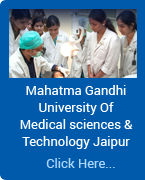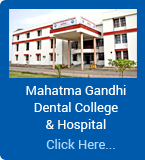
Introduction
The Department of critical care at Mahatma Gandhi Hospital renders round the clock quality care to all patient groups ailing with any life-threatening or chronic disease conditions requiring life support therapy. Patients having dysfunctions or failure of one or more organ systems like pulmonary, cardiac, neurology, kidney and liver are admitted to the Intensive Care Unit (ICU). Our expert multidisciplinary team focuses on offering comprehensive care to all the ICU patients. We have the largest, well trained, skilled and highly efficient team of doctors and staff in critical care medicine.
The department handles a vast number of patients every year out of which nearly 40% are on advanced ventilator support.
Mahatma Gandhi Hospital,Jaipur specializes in delivering utmost care and comfort for the patients suffering from major health problems such as:
Sepsis and septic shock
ARDS
Organ Failure (Respiratory, liver, kidney, heart)
Trauma
Severe burns
Organ transplants
Stroke
We specialize in life support modality that is ECMO (Extracorporeal membrane Oxygenation) and ECMO retrieval services.
We have designated Units for Disease Specific Care like:
- Medical Intensive Care Unit (MICU)
- High Dependency Unit (HDU)
- Intensive Coronary Care Unit (ICCU)
- Surgical ICU (SICU)
- Paediatric ICU (PICU)
- Neuro Intensive Care Unit (NICU)
- Transplant ICU (Kidney & Liver)
- ECMO & CRRT Unit
- Isolation ICU - Oncology & Bone Marrow Transplant
ECMO
ECMO is an extracorporeal technique of providing prolonged cardiac and respiratory support to persons who get life-threatening forms of respiratory and/or cardiac failure, which are unresponsive to conventional therapy.
It is a life support system required for those patients who have a severe and life-threatening illness that impairs their heart or lungs. For example, ECMO is used during life-threatening conditions such as severe lung damage from infection, or shock with reduced heart function after a massive heart attack or poisoning/drug overdose.
It has been successfully used as a bridge to heart and/or lung recovery, heart/lung transplantation.
When the patient is placed on ECMO, his/her heart may be supported by the ECMO machine (in VA - ECMO) and blood receives oxygen from an artificial lung in the ECMO circuit. Thus the oxygen needs and/ or heart support are maintained till the patients’ lungs and heart are able to work on their own again.

How does ECMO work?
A tube (catheter) is placed in a large vein (in the neck, groin or chest of the patient) and deoxygenated blood or impure blood is drained and run through a pump (external or artificial heart) and an oxygenator (artificial or external lung) along with a sweep gas flow system which will entrain oxygen and remove carbon dioxide from this blood. This oxygenated or pure blood will look bright red and is pumped back to the patient.

The ECMO Machine
The machine components include
- TUBINGS: These act as pathways to take blood from the patient to the machine and back to the patient.
- PUMP: to take and return blood to the patient.
- MEMBRANE: to remove carbon dioxide and add oxygen.
- HEMOTHERM: to warm the blood and maintain body temperature.

When to use ECMO?
ECMO is used when the patient is suffering from a life-threatening systemic illness like severe pneumonia (ARDS), heart failure, cardiorespiratory failure (reversible) related to infection or Surgery, where all other forms of medical therapy have failed to cause significant improvement.
At the same time, it needs to be judiciously and promptly instituted in conditions that are known to be reversible with time and appropriate medical therapy (infection, pneumonia, reversible lung dysfunction). It has to be remembered that ECMO is not a curative measure but helps in resting the heart and/ or lungs that are diseased giving them time to recover.
ECMO TEAM:
Managing a patient on ECMO is a multidisciplinary team effort.
Our Team consist of:
- Critical Care Physicians
- Cardiac Surgeons & Anaesthesiologist
- Cardiologist
- Perfusionist
- ECMO Nurse
- Physiotherapists
Department of ECMO at Mahatma Gandhi Hospital is the largest ECMO centre in the state of Rajasthan. Here we have 6 bedded specialised ECMO unit with all modern equipments and trained team members.
Faculty

Dr. Priyambada Gupta – MD Anesthesia, PHOD, Critical Care |

Dr. Ashish Jain – MBBS, DNB, IDCCM, FIECMO Associate Professor, Dept. of Pulmonary Medicine Director, Critical Care Unit I |

Dr. Srishti Jain – FFICM UK F.N.B Critical Care EDIC,EDARM M.D,DNB Respiratory Med Asst.Prof & Add. Director Critical Care Unit |

Dr. Prachi Verma – MD Anesthesia, IDCCM Critical Care Assistant professor - Critical Care Medicine Consultant - Critical Care Unit |

Dr Munesh kumar meena – MD Anaesthesia,IDDCM critical care Assistant professor - critical care medicine Consultant - Critical Care Unit |

Dr. Anand Kumar Jain – MBBS, DNB IDCCM Assistant Professor, Dept. of Critical Care |

Dr. Ravi Jain – FNB Critical care MD Anesthesia Assistant professor- Critical care medicine. |

Dr. Divyansh Gupta, – FNB Critical care MD Anesthesia Assistant professor & Consultant - Critical care. |

Dr Rohit jain, – DNB Anesthesia, IDCCM Assistant professor and consultant - Critical Care |

Dr Puneet Panwar, – MD anesthesia Consultant critical care medicine |

Dr Rohan Tambi, – MD Respiratory medicine Asst professor respiratory medicine & consultant critical care |

Dr Manish Goyal – FNB Critical Care, MD Anesthesia Assistant Professor, Department of Critical Care |

